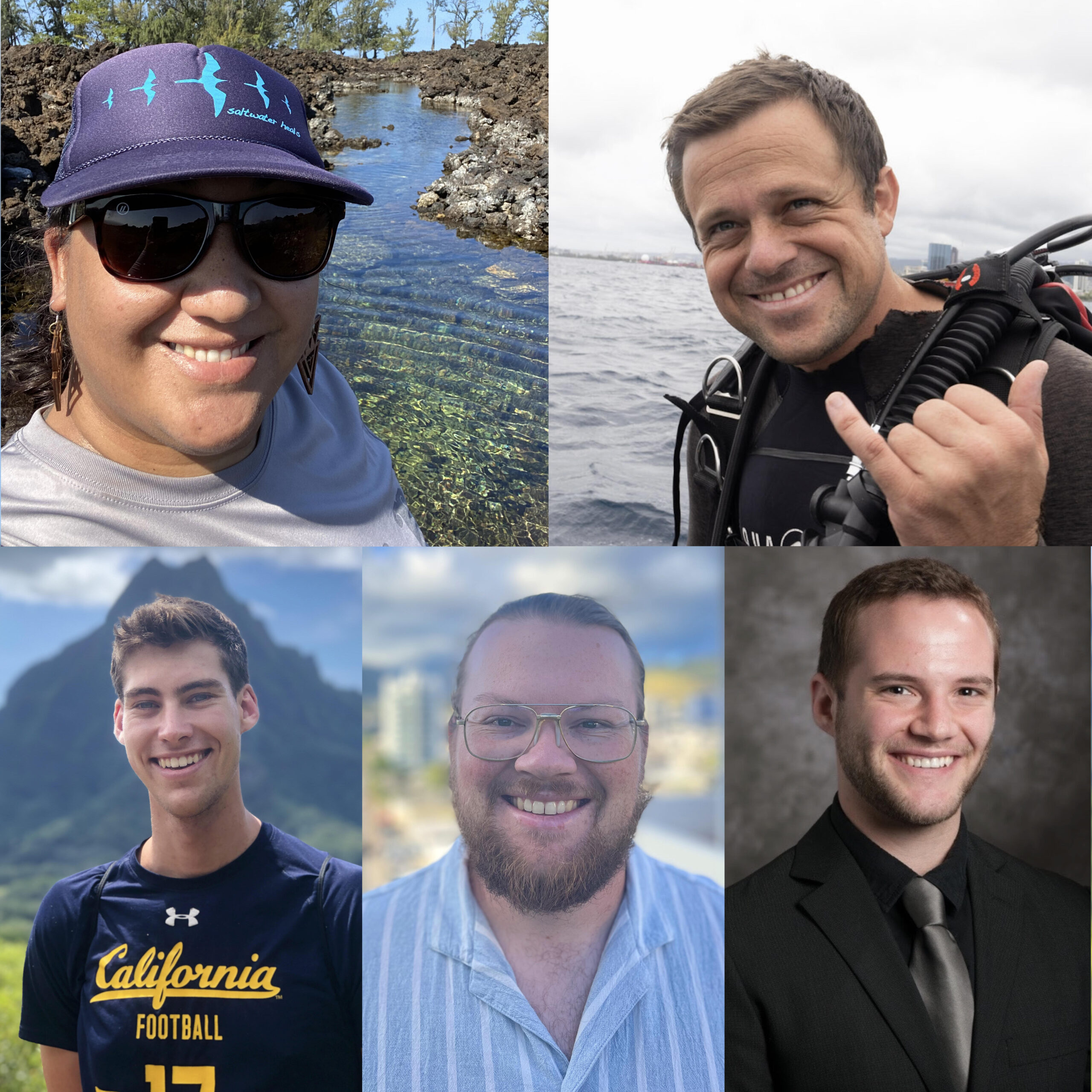Graduate students awarded ARCS Foundation scholarships
 2024 ARCS awardees (clockwise from top left): Kekuʻiapōiula (Kuʻi) Keliipuleole, James Fumo, Zachary Fumo, Lucas Ellison, Blake Stoner-Osborne.
2024 ARCS awardees (clockwise from top left): Kekuʻiapōiula (Kuʻi) Keliipuleole, James Fumo, Zachary Fumo, Lucas Ellison, Blake Stoner-Osborne.
The ARCS Foundation Honolulu Chapter selected five graduate students in the University of Hawai‘i (UH) at Mānoa School of Ocean and Earth Science and Technology (SOEST) to receive ARCS Scholarships. At the 2024 ARCS Scholars Banquet on May 6, the foundation honored 20 UH Mānoa doctoral candidates who were named ARCS Scholars. The chapter kicked off its 50th anniversary year by increasing ARCS Scholar Award funding to $6,000 for each scholar. The unrestricted grants provide resources for professional travel, computer and research equipment and materials, and educational and personal expenses at the recipient’s discretion.
The five 2024 Honolulu ARCS Scholars from SOEST programs are listed below. For more information about each scholar, visit ARCS Foundation Honolulu Current Scholars.

Lucas Ellison
Lucas Ellison, a doctoral candidate in Earth Sciences with Sloan Coats, was selected to receive the Toby Lee ARCS Award in Earth Sciences. Lucas’s research focuses on identifying the full range of causes and impacts of simulated drought events in climate model simulations. By identifying the consistency of these causes and impacts in simulations, researchers can start to determine the level of predictability of drought events in climate models. Most recently, Lucas published a study that assessed drought in the 2011–14 drought in the western and central United States, which is among the most severe and persistent in recorded history.
James T. Fumo
James Fumo, a graduate student in the Marine Biology Graduate Program with advisor Alison Sherwood, was selected for the H. Keith and Sue Ernst Award in Marine Biology. James studies the dispersal and biogeography of macroalgae in the Hawaiian Islands. His research aims to find the source location of a nuisance alga first seen at Manawai (Pearl and Hermes Atoll) in 2016. His curiosity about algae was sparked from his experiences as a diver and from seeing first-hand the important roles these organisms play. This knowledge is crucial for informing conservation efforts aimed at preserving the biodiversity and ecological integrity of Hawaiian marine environments.
Kekuʻiapōiula (Kuʻi) Keliipuleole
Kekuʻiapōiula (Kuʻi) Keliipuleole, a doctoral candidate in the Marine Biology Graduate Program with advisor Rosie Alegado, was selected for the George and Mona Elmore ARCS Award in Zoology. Ku‘i studies loko waiʻōpae (anchialine ecosystems, which are typically small, nearshore pools which form in limestone or volcanic rock) and the tiny red shrimp that occupy them, ʻōpaeʻula (multiple species). Through her research she aims to understand how certain factors, like water quality, predators, microbial assemblages, and seasonal and tidal cycles affect ʻōpaeʻula presence and behavior. In partnership with Kamehameha Schools and other North Kona community organizations, the goal is to have a clear understanding of how to mitigate the threats these unique ecosystems and their special organisms face, so healthy populations of ʻōpaeʻula can be restored.
Zachary M. Menzo
Zachary Menzo, a doctoral candidate in Atmospheric Sciences with advisor Christina Karamperidou, was selected for the Ellen M. Koenig ARCS Award in Atmospheric Sciences. His research delves into the impact of El Niño on extreme humid heat, expanding the analysis to encompass ENSO diversity. The aim is to enhance comprehension of the additional heat stress El Niño events may cause in the future. This information can help communities adapt to increasing extreme humid heat events and potentially offer advanced warnings for improved emergency management.
Blake R. Stoner-Osborne
Blake Stoner-Osborne, a doctoral candidate in the Department of Oceanography with advisors Jeffrey Drazen and Brian Popp, was selected to receive the George and Mona Elmore ARCS Award in Oceanography. His research is attempting to reveal ways in which the marine food web connects coral reef and deep sea environments by analyzing stable isotopes of amino acids and gut contents of small, highly migratory, deep-sea fishes, shrimps, and squids that feed in nearshore surface waters at night. Establishing ecosystem connectivity around tropical Pacific Islands is essential for the creation of effective fisheries and conservation policy that protects species of top predators (like bigeye tuna, swordfish, spinner dolphins, and whales) that feed on these deep-sea animals and are commonly found in nearshore environments in Hawai‘i. Blake is a National Science Foundation Graduate Research Fellow and is passionate about education and outreach, mentorship, and student support.
The ARCS Foundation non-profit volunteer group that works to advance science in America by providing unrestricted funding to outstanding U.S. graduate students in STEM fields. The Honolulu chapter has provided more than $2.7 million to UH more than 650 graduate students since 1974.




